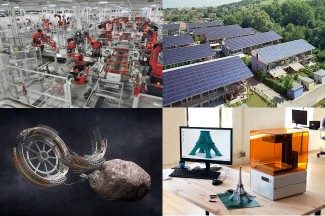

Watch the Interview Presentation
Read the Transcript
Read the transcript of the The Breakaway Economy Part 1 here (PDF)
Listen to the Interview MP3 audio file
Download the Interview audio file
Subscriber Resources:
Financial Elites and Transnational Business: Who Rules the World?
Rules for Radicals: A Pragmatic Primer for Realistic Radicals.
“We are in the midst of an historic pivot of investment and credit.” ~ Solari Report Annual Wrap Up
By Catherine Austin Fitts
This week’s Solari Report is a follow up to your questions on our January Annual Wrap Up.
It is a briefing on the parts of the global economy experiencing significant investment, including from funds shifted out of governmental systems over the last twenty years and technology transferred from black budget programs.
In the first part, I will brief you on WHO is running things and what their concerns are.
We will look top down – from the global or G-7 level as well as from the viewpoint of the managers of large intergenerational pools of capital, such as pension funds, sovereign wealth funds and pools of family and private syndicate wealth. We will also look bottom up – from the viewpoint of an individual or head of household, the head of a small business or a small town mayor. How does this change how we relate to our family, our community and our colleagues?
In the second part, on March 13, I will address WHAT is happening – what we are building, growing and doing.
In Let’s Go to the Movies, I will review Sputnik Mania, a marvelous documentary about the response of the United States to the Russian’s successful launch of the Sputnik satellite in 1957 and the forces at work to build popular support for the “military industrial complex.”
It’s the last week of the month – so no Money & Markets. Post questions for the Breakaway Economy!



Excellent presentation, Catherine. Thank you for sharing your knowledge and wisdom.
My link to the interview isn’t functioning. Any one else having this problem?
The Fed is doing a pretty good job of expanding credit on its own these days.The public is not and business is a little but velocity isn’t happening until the public goes back to borrowing. The fractional reserve system creates money from nothing and contributes to inflation but banks are not lending much at present because the the Fed is telegraphing investment decisions to them. Besides, the public still wants to deleverage. A collapse would require a loss of liquidity and here again the Fed has been cranking it out. Tapering adjusts for smaller government deficits the next couple years but it looks like liquidity will remain high allowing stocks to go up and asset prices to rise. I feel richer, don’t you? As long as the Fed is careful and we can continue to benefit from cheep labor overseas, I think we could go on like this for a long time yet. But expect some big bumps!
Positively yours,
Doug
My understanding is feeble but here is something I am having trouble with. The Fed doing a journal entry of debt in the books does not cause inflation, the debt would have to reach out into the economy and cause volocity. So without the ability to make that happen how is a collapse prevented? My take on the fractional reserve lending system is a ponzi scheme and must collapse if credit does not expand. Where is the flaw in my thinking. Thank you very much. Bob Oldwyn
The Fed has created mainly asset inflation overseas and general inflation overseas, not in the US. The main credit creation globally is in China and specifically the shadow banking system, elsewhere you have Japanese QE and Eurozone deflation. There is the ability to create credit centrally that is why the government deficits are high and interest rates are low (If they were not then deflation world have prevailed). Ultimately though the reason the US has the reserve currency is that is the most advance military power both overtly and covertly (black budget) secondly the US has the trump card of very low cost food all of which can be grown domestically. If you believe in the economic collapse of the US then by you have to believe in a colossal global depression. Since the US is best placed to survive this depression you should ask yourself in that scenario what will China, Russia and the EU look like in terms of stability. They will probably have to start wars before anything in the US is even that bad. Therefore since you are in the country best placed to fight WW3 it is already taken care of and not a useful scenario to think about (Doesn’t mean you shouldn’t have extra food storage etc) . Focus on your own situation and improving that. Many countries have broadly speaking become less stable over the past few years examples are Greece, Egypt, Argentina, Venezuela, Italy, Spain, Cyprus, Brazil, South Africa, Thailand. In all of these countries there are people who have thrived in an ethical way helping those around them. You are on the right blog to hep you achieve this 🙂
Gavin x